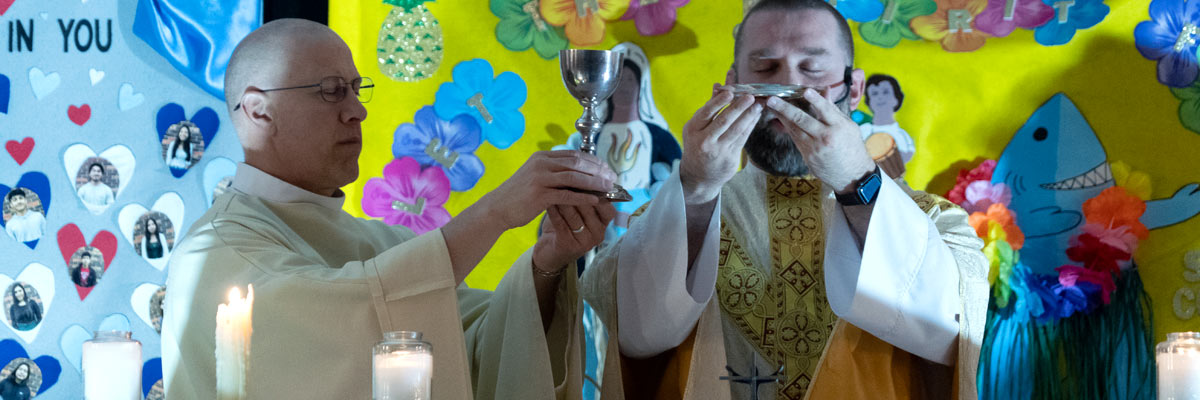Official Website of the
Catholic Diocese of Little Rock
Call to repent brings healing, forgiveness
Published: December 11, 2010
This is the ninth column in a 13-part series
By Clifford M. Yeary
Associate Director, Little Rock Scripture Study
In the Gospel of Mark the first recorded words of Jesus are, “This is the time of fulfillment. The kingdom of God is at hand. Repent, and believe in the Gospel” (1:15). The Greek word for repentance is “metanoia.” It means to change one’s mind and heart. It might be used to indicate a decision to quit performing a single sinful action or to abandon a harmful attitude in a person’s life.
 But Jesus’ call to repent is a call to turn one’s entire life around. Whatever life we lived before hearing the Good News of the nearness of God’s kingdom, once we become aware of it, we are to abandon our previous goals, ambitions, desires and pursuits in order to be part of God’s kingdom.
But Jesus’ call to repent is a call to turn one’s entire life around. Whatever life we lived before hearing the Good News of the nearness of God’s kingdom, once we become aware of it, we are to abandon our previous goals, ambitions, desires and pursuits in order to be part of God’s kingdom.
Placed at the beginning of the Gospel of Mark, the call to repentance is to be understood as implicitly present in all Jesus’ words and actions. When Jesus proclaims a parable about the kingdom of God, those who hear (or read) the parable are to understand that this total repentance is the key that allows entry into God’s kingdom, the realm where God’s will for us always prevails.
The great irony in the Gospels is that sinners are far more likely to hear the Good News of the kingdom and repent than those who have dedicated their lives to observing the rules of the law of Moses. Those who see themselves as actively pursuing righteousness (the Pharisees in particular) fail to understand that the radical nature of God’s kingdom requires that even they must repent.
In Luke 5:32, where Jesus says, “I have not come to call the righteous to repentance but sinners,” he is not saying that the righteous have no need to repent. It is the great loss of those who think of themselves as righteous that they can’t hear the call to repentance. The gift of God’s kingdom, which brings with it God’s forgiveness of sins, is only given to those who know they don’t deserve it. This is made abundantly clear in the parable concerning the prayers of the Pharisee and the tax collector (see Luke 18:9-14).
It is not only the “righteous” who ignore the call to repentance, however. Just as sinners are more likely to see their need for repentance, so too, the poor are far more likely to surrender their lives to the kingdom than are the rich. “It is easier for a camel to pass through (the) eye of (a) needle than for one who is rich to enter the kingdom of God” (Mark 10:25).
Only repentance sheds one of the cares and concerns that preoccupy the soul. The “things” of this world all too often prevent the life-giving entrance of God into our lives. The more material things we have the harder it is to be centered on spiritual values.
This call to radical, life-changing repentance would seem to demand more than anyone, rich or poor, devout or irreverent, could possibly be expected to give. The Gospels do in fact tell us that it was too much for many people. The example of one devout, rich young man may well be representative of many others. Having observed the commandments all his life, he comes to Jesus seeking the way to eternal life. Jesus tells him he needs to sell all that he has, give to the poor, and to come, follow Jesus. He leaves Jesus’ company saddened. His wealth is something he cannot relinquish (see Matthew 19:16-22).
In spite of the apparent all-or-nothing demand Jesus places on his followers, he is popular with the masses. When the religious leaders conspire against him, they are at first fearful of the crowds that swarm around him (see Mark 14:2). How can someone who demanded so much from his followers have been so attractive to so many?
Jesus’ call to repentance was a call to respond to the even more radical, life-changing love of God. Jesus himself was the expression of that love, and virtually everything he did and said in his ministry was a sign to everyone that God was coming to his people with forgiveness, healing and festive welcome (see Luke 7:18-35).
It seems in Jesus’ time, and perhaps in ours as well, it was the poor who felt most deeply their need for God. It was the sinner who felt most bitterly the estrangement from God caused by sin. And it was the poor and the sinful that found in Jesus a welcome from God that drew from them a complete surrender in repentance.
Study Questions
- What does repentance mean?
- Why would Jesus’ call for radical repentance have attracted followers?
- How has Jesus’ call to “Come, follow me,” (Matt 19:21) changed your life?
- As members of Jesus’ body on earth, how can your own faith community better attract others to respond to Jesus’ call?
This article was originally published in Arkansas Catholic Dec. 11, 2010. Copyright Diocese of Little Rock. All rights reserved. This article may be copied or redistributed with acknowledgement and permission of the publisher.









